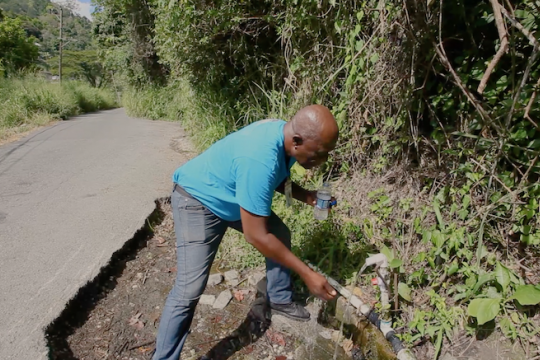- Researchers from CATIE supported the establishment of the Payment for Ecosystem Services (PES) schema for the Yallahs River and Hope River Watershed Management Units
Tuesday February 19, 2020. On the southern slopes of the Blue Mountain range of Jamaica, and east of the capital of Kingston, the Yallahs River and Hope River Watershed Management Units (WMUs) extend for 44,486 ha, supply 42% of Kingston's water, and are adjoining hydrologic basins that provide a variety of ecosystem services to the near 667,000 inhabitants living nearby.
Under this context, the Government of Jamaica requested the support of the researchers from the Development, Economics and Environment Research Program (PIDEA), of the Tropical Agricultural Research and Higher Education Center (CATIE, by its Spanish acronym), to propose a governance structure for the Payment for Ecosystem Services (PES) scheme in Yallahs and Hope Watersheds (YHW), outline the responsibilities of each of its components, and assess the structure according to the context in which the PES will be developed and implemented.
Roger Madrigal, director of the Latin-American Chair of Environmental Decisions for Global Change (CLADA, by its Spanish Acronym), dependency of PIDEA, and director of EfD-CA, explained that a water-related PES is a financial mechanism that pays farmers for implementing soil and water conservation practices, and for the protection of forests that enhance water availability and the reduction of erosion problems.
Madrigal, who was one of the main researchers in elaborating the PES scheme proposal, added that the support of CATIE was developed during almost a two years period, starting in 2018, and finishing by the end of 2019.
"We used our experience for over 15 years on PES design and implementation in Latin America and the Caribbean to support the Jamaican government in the development of this innovative initiative for the island", said the researcher.
A very relevant aspect about the work done is that industries, farmers and households, among others, depend on the water coming out from YHW. "By the technical advice provided, we are helping to secure this vital resource, thus sustaining economic growth and meeting the needs to water of thousands of people living in these watersheds", stated Madrigal.
On behalf of CATIE (or EfD-CA), Madrigal participated as keynote speaker. Among the participants of the event were members of the Parliament of Jamaica, representatives from the Inter-American Development Bank (IADB), NEPA and from other relevant stakeholders.
